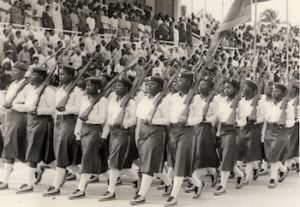
Zanzibar Women Soldiers
On this date in 1963, Zanzibar gained its independence from Britain. This repaired the invasion of the 1884 Berlin Conference, the high point of white European competition for territory in Africa, a process commonly known as the Scramble for Africa.
The history of Zanzibar is out of proportion with its size. Mention the name Zanzibar to conjure up an air of mystery. Sultans, ivory, slaves, spices, navigators, and explorers--words that start to tell the story of Zanzibar.
Zanzibar Island is part of Tanzania, and the Zanzibar archipelago is surrounded by more than 20 other uninhabited islands just off the coast of Tanzania. The name combines the two countries' names—Tanganyika and Zanzibar. It is the biggest and most populated island within the These small islands have, in centuries past, held sway over large parts of mainland Africa and the islands of the Indian Ocean, controlling trade routes from the continental interior to the markets of Arabia, India, and farther abroad.
Empire builders have highly prized the islands of Zanzibar. Bantu, Egyptian, Arab, Portuguese, and British have all taken possession of the territory and valued it as a “jewel in the crown,” both for its strategic position off the East Coast of Africa, pivotal to the prosperous trade in slaves, ivory, ebony, and gold, and because of its freshwater, fertile soils, and temperate climate. It is this history, above all, that sets Zanzibar apart. The British kept the Sultan in position, but as the royal family bickered and squabbled among themselves, this became an increasingly puppet role.
When it was part of the British Empire, Zanzibar benefited from trade and a considerable amount of engineering and building work in Zanzibar Town. These works included the construction of the deep-water harbor and the draining of the old creek that had, up until then, made Stone Town an island. All the more surprising that when the British finally gave back Zanzibar her independence in 1963, the Sultan was reinstated as sovereign, and almost all of the wealth and power was handed back to the old Arab families.
It was no surprise that the people of Zanzibar rose against this unfairness a year later, in a bloody revolution, installing Sheik Abeid Amani Karume as president, the first African leader in Zanzibar for at least 500 years. By the time of its independence, the economy of Zanzibar, which had been in steady decline for decades, was not very healthy. Over the next 20 years, a combination of unfortunate prices collapsed in the prices of cloves and copra, and the two primary exports, combined with some somewhat naive and interventionist government policies, brought the country to its knees.
Only during the 1990s, after the government became more moderate, was the new primary industry of Zanzibar able to get started. Although relatively small, tourism is far from the primary earner for the country and is expected to continue under the responsible and ecologically sound policies of President Salmin Amour. In 1963, Britain finally granted Zanzibar its independence, handing over power to the alliance government and reinstating the Sultan as a constitutional monarch. Unfortunately, Sultan Abdullah failed to live long enough to take control, dying in the autumn after having both legs amputated. His son Jamshid instead took the throne.
At the same time, the coastal strip was ceded to Kenya, which obtained independence two days later.